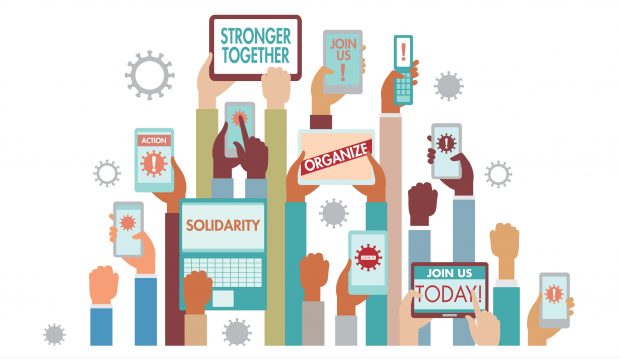 The sudden disruption caused by the COVID-19 pandemic had the potential to upend Shayok Chakraborty’s work as a community organizer with the Greater Boston Interfaith Organization. “The whole point of the job is to have one-to-one meetings with people, listen to people’s stories and eventually gather someplace in a public fashion,” he explains. How could that work continue amid public health restrictions?
The sudden disruption caused by the COVID-19 pandemic had the potential to upend Shayok Chakraborty’s work as a community organizer with the Greater Boston Interfaith Organization. “The whole point of the job is to have one-to-one meetings with people, listen to people’s stories and eventually gather someplace in a public fashion,” he explains. How could that work continue amid public health restrictions?
Now, Chakraborty ’19 has come to see Zoom as a new part of the activist toolkit while the fundamentals of the work remain the same. In his view, there is a potential upside to the upheavals of the year 2020: “People are seeing things they maybe didn’t have to think about,” he says. “People don’t stick around in organizing or activism unless it is real to them in their own life. … There will hopefully be some longer-term base-building, awakening, consciousness.”
Three thousand miles from Boston, Darrell Jones III ’14 is also working to change the dynamics of power in communities. He had never seen himself as an activist but “tried to do what I do with an open heart and let my open heart lead the way,” he says. And although active in the business world, he “always had this other part of me that needed to act, to make compassion a verb in some way, shape or form.”
Jones is deputy director of Just Cities, based in Oakland, California, an organization co-founded by the late Congressman Ron Dellums. Jones says that “we like to proceed with something we call transformative justice, where we center the voices of those most proximate to pain.”
Both Chakraborty and Jones see pros and cons in the role technology is playing in activism. Technology makes possible breadth—”You can reach a bunch of folks very quickly,” says Jones. “It allows a lot of voices to be heard.” But “oftentimes we sacrifice depth,” he adds. “Expertise, truth and authority can go by the wayside.”
Chakraborty says that he “used to be super-scornful of online activism”—
sometimes called “clicktivism.” “There’s a strain of activism that is about posting a super-funny tweet, a clever one-liner, and that’s it,” he says. “That’s deeply irritating. A lot of people are going through a lot of stuff. When you make it into saying something smart and get some likes and then let’s move on, that’s not enough.” But, Chakraborty concludes, “I’ve grown to see there is a real use for it. Clicktivism helps a lot of people learn about these things and get into it.”
Ultimately, Jones sees a big part of the future of activism as “an invitation for each individual to go deeper within their own sense of self, in their own heart space, and try to infuse how they show up with a spirit of compassion and love.”
Chakraborty’s hope for activism in a post-pandemic world is that people won’t give up. “There’s always a pattern where a crisis will happen, and people get angry and grief-stricken or whatever they are feeling. They come together, do great stuff, and once it’s over, they leave, move on with their lives,” he says. “As much as people can stay, just stay doing some kind of work, whatever it means for them—that’s the only way we’ll make the long-term changes we are talking about.”
